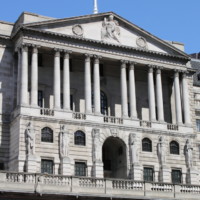
The bank’s nine-member Monetary Policy Committee (MPC) voted by a majority of 6-3 to increase the base rate from 1 per cent, already the highest in 13 years, to 1.25 per cent. (Those members in the minority wanted to increase the rate by 0.5 percentage points, to 1.5 per cent.)
The increase marks the first time since January 2009 that the rate has surpassed one percent.
The rise was widely expected, and comes as the BoE tries to curb the soaring inflation that was spurred by the Coronavirus pandemic, a weakening GDP, the cost-of-living crisis and the global effects of Russia’s invasion of Ukraine. The central bank’s chief economist, Huw Pill, had warned last month that “more needs to be done” to curb inflation.
Inflation rose from seven per cent in March to nine per cent in April, the highest level in more than 40 years. The bank’s target level for inflation is two per cent.
Base rate rises are one of the mechanisms used by Governor Andrew Bailey and other policymakers at the BoE to try to keep inflation under control. Higher borrowing costs generally mean people spend less.
Mortgage borrowers
For homeowners on a fixed-rate mortgage, the increase won’t have an immediate impact on their mortgage. (Around three quarters of UK homeowners have a fixed-rate deal.)
But people with a variable rate mortgage are likely to feel the increase fairly soon. Higher rates will probably also trickle through for people planning to remortgage.
Data from Moneyfacts show that average two-year fixed rates from the top 10 lenders in June had tripled from the lows seen in October 2021. The average lowest two-year fixed rate in June, before this latest BoE increase, came to 2.71 per cent (up from 0.89 per cent) while the average five-year fixed rate rose to 2.78 per cent from 1.05 per cent.
‘Good cop, bad cop’
Laith Khalaf, head of investment analysis, AJ Bell, said: “The Treasury and the Bank of England are effectively playing the role of good cop, bad cop with UK consumers. On the one hand, the chancellor is giving away billions of pounds in helicopter money to help ease the cost-of-living crisis, while at the same time the Bank of England is cranking up the pressure on household finances by increasing borrowing costs.
“Consumers probably won’t be best pleased to find that some of the fiscal giveaways they have been handed by the chancellor are going to be gobbled up by higher interest rates. But if the Bank had failed to take any action, the pound would have come under further pressure, which adds to the cost-of-living crisis by pushing up the price of commodities priced in dollars, especially fuel. It would also increase the chance that inflation becomes embedded in the system and lasts for longer.
“Ultimately, the risk is that the combination of the energy price shock and rising interest rates leaves the UK in recession, having only just climbed back to pre-pandemic levels of economic activity.”
Richard Pike, Phoebus Software sales and marketing director, said today’s increase “is one that most people were expecting and, hopefully, preparing for. The thing to understand is that this is a global problem, just yesterday the US increased its interest rates by the biggest percentage in 30 years: we are not alone in having to deal with spiraling inflation. Covid and the war in Ukraine have both taken a huge toll and the knock-on effect will be long lasting.”
“It is encouraging therefore”, he said, “to read that the FCA has today reminded lenders of their responsibility to provide help to customers struggling with payments. However, this does of course mean that lenders will need the resources to identify vulnerable borrowers at an early stage to be able to offer the help that is required.”
When will it end?
Adrian Anderson, director of property finance specialists at Anderson Harris, had a question of his own.
“Inflation is running red hot and this interest rate rise means higher borrowing costs for mortgages, credit cards and other loans. The question I keep on being asked is ‘When will these rate hikes stop?’ and I don’t think the MPC know the answer”, he said. “The Bank of England are playing catch up as at the beginning of the inflation crisis we were told this is a temporary issue due to supply chain problems and this is clearly not the case.”
Anderson said his firm was “encouraging homeowners to remortgage as early as they can” and was contacting clients six or more months in advance “rather than the usual three to four months before a rate renewal due date.”
















